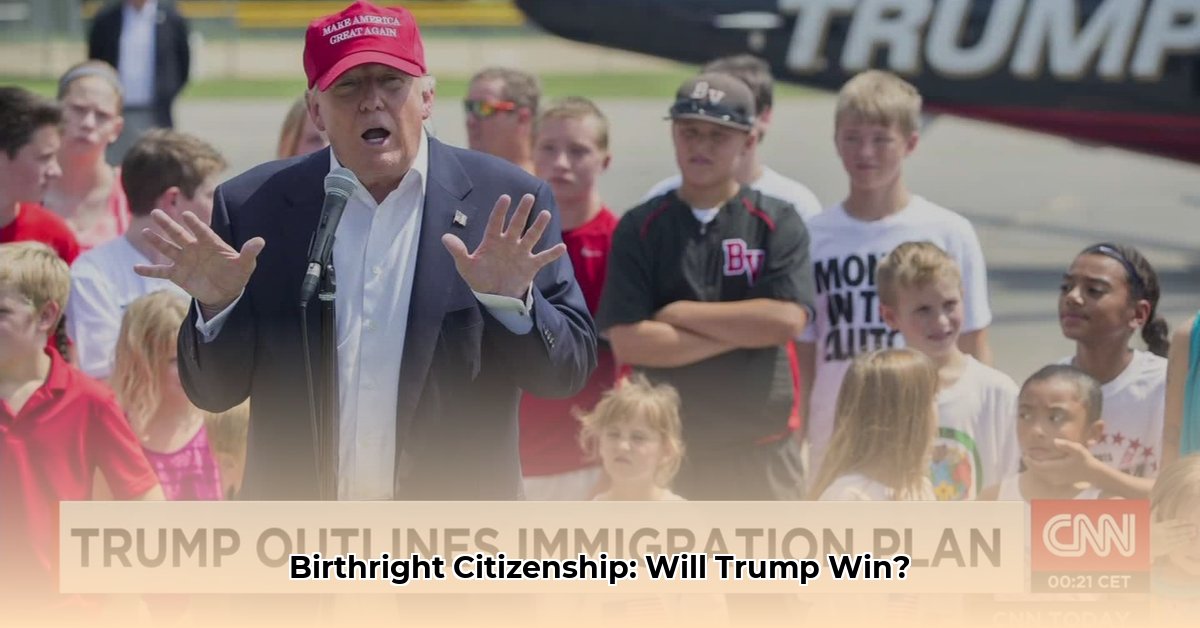This in-depth news analysis examines the legal challenges surrounding former President Trump’s 2025 executive order, which sought to restrict birthright citizenship. See other Trump executive orders for context. We’ll explore the arguments, key players, potential outcomes, and the broader implications for American identity and immigration policy.
The Executive Order: Reshaping Citizenship?
Shortly after his second inauguration in January 2025, President Trump issued an executive order aiming to limit birthright citizenship for children born in the U.S. to undocumented immigrants and those with temporary visas, unless the father was a U.S. citizen or permanent resident. This action immediately ignited a legal firestorm, with various states, cities, and organizations filing lawsuits challenging its constitutionality.
The 14th Amendment: At the Heart of the Debate
The legal battle centers on the interpretation of the 14th Amendment, ratified in 1868. The amendment states, “All persons born or naturalized in the United States and subject to its jurisdiction, are citizens.” The crux of the disagreement lies in the phrase “subject to its jurisdiction.”
- Trump Administration’s Argument: The administration argued that children born to undocumented immigrants are not truly “subject to the jurisdiction” of the United States and therefore should not be automatically granted citizenship. This interpretation, they argued, aligned with practices in other nations where children born to foreign visitors do not automatically become citizens.
- Opponents’ Argument: Challengers argued that this interpretation contradicts decades of legal precedent and a common understanding of the 14th Amendment, which has long been interpreted to grant citizenship to anyone born on U.S. soil, regardless of their parents’ immigration status. They asserted that “subject to its jurisdiction” refers to all individuals within U.S. borders, with limited exceptions.
Legal Challenges: A Multi-Pronged Attack
The lawsuits challenging the executive order raised several key arguments:
- Violation of the 14th Amendment: The order directly contradicts the established interpretation of birthright citizenship.
- Overreach of Presidential Power: The president lacks the constitutional authority to unilaterally redefine citizenship; this power rests with Congress and the judiciary.
- Harm to States and Individuals: The order would create a class of stateless children, limiting their access to essential services and placing a strain on state resources.
Prominent figures, including Attorneys General from several states, publicly condemned the order. New Jersey’s Attorney General, Matthew Platkin, called it “a flagrant violation of our Constitution.” Similar statements from other state officials underscored the seriousness of the legal challenge.
Who is Suing?
A coalition of eighteen states, along with the District of Columbia and the city of San Francisco, filed lawsuits seeking to block the executive order. The American Civil Liberties Union (ACLU) and several other non-profit organizations also launched separate legal challenges.
Timeline of Key Events
| Date | Event |
|---|---|
| Late Jan 2025 | President Trump issues executive order on birthright citizenship. |
| Late Jan 2025 | Multiple states, D.C., and San Francisco file lawsuits challenging the order. |
| Late Jan 2025 | The ACLU and other organizations file separate lawsuits. |
What Happens Next? Potential Outcomes and Implications
The legal challenges surrounding Trump’s executive order raise complex questions about the future of birthright citizenship in the United States. Several potential outcomes exist:
- The Courts Uphold the Executive Order: This scenario would represent a dramatic shift in American immigration policy, potentially impacting hundreds of thousands of children and creating a new class of stateless individuals. This outcome could also expand presidential power in interpreting the Constitution.
- The Courts Strike Down the Executive Order: This would reaffirm the traditional understanding of birthright citizenship and maintain the status quo. It would likely be seen as a victory for supporters of a broader interpretation of the 14th Amendment.
- A Revised Interpretation of “Subject to Its Jurisdiction”: The courts could offer a new interpretation of this key phrase, potentially clarifying the scope of birthright citizenship while acknowledging some limitations.
The ultimate court decision, which remains unknown, is crucial for understanding the current legal framework surrounding birthright citizenship. This missing piece of information will determine the long-term implications of Trump’s executive order and its impact on families, states, and the broader political landscape.
The Bigger Picture: A Nation Grapples with Identity
The legal battle over birthright citizenship reflects a deeper national debate about American identity, belonging, and the future of immigration policy. Regardless of the final outcome, this case highlights the complexities and evolving interpretations of fundamental constitutional principles. It underscores the need for ongoing legal analysis, research, and public discourse to navigate these challenging issues. As new information emerges, our understanding of birthright citizenship and its implications for the nation will continue to evolve.







